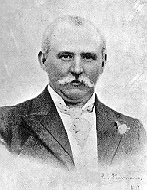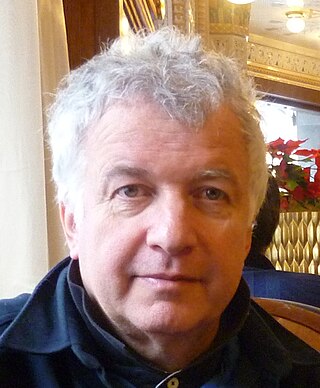Related Research Articles
A horoscope is an astrological chart or diagram representing the positions of the Sun, Moon, planets, astrological aspects and sensitive angles at the time of an event, such as the moment of a person's birth. The word horoscope is derived from the Greek words ōra and scopos meaning "time" and "observer". It is claimed by proponents of astrology that a horoscope can be used as a method of divination regarding events relating to the point in time it represents, and it forms the basis of the horoscopic traditions of astrology, although practices surrounding astrology have been recognized as pseudoscientific since the 18th century. Horoscope columns are often featured in print and online newspapers.
Western astrology is the system of astrology most popular in Western countries. It is historically based on Ptolemy's Tetrabiblos, which in turn was a continuation of Hellenistic and ultimately Babylonian traditions.
Most horoscopic traditions of astrology systems divide the horoscope into a number of houses whose positions depend on time and location rather than on date. In Hindu astrological tradition these are known as Bhāvas. The houses of the horoscope represent different fields of experience wherein the energies of the signs and planets operate—described in terms of physical surroundings as well as personal life experiences.

In Western astrology, astrological signs are the twelve 30-degree sectors that make up Earth's 360-degree orbit around the Sun. The signs enumerate from the first day of spring, known as the First Point of Aries, which is the vernal equinox. The astrological signs are Aries, Taurus, Gemini, Cancer, Leo, Virgo, Libra, Scorpio, Sagittarius, Capricorn, Aquarius, and Pisces. The Western zodiac originated in Babylonian astrology, and was later influenced by the Hellenistic culture. Each sign was named after a constellation the sun annually moved through while crossing the sky. This observation is emphasized in the simplified and popular sun sign astrology. Over the centuries, Western astrology's zodiacal divisions have shifted out of alignment with the constellations they were named after by axial precession of the Earth while Hindu astrology measurements correct for this shifting. Astrology was developed in Chinese and Tibetan cultures as well but these astrologies are not based upon the zodiac but deal with the whole sky.
Noel Jan Tyl was an American humanistic astrologer and writer of many books on the subject. In the 1960s and 70s he was a bass-baritone opera singer who was particularly noted for his Wagnerian roles.

Liz Greene is an American-British astrologer and author. Her father was born in London, and her mother in the United States.
Bruno Huber was a Swiss astrologer and psychologist. In 1968, with his wife, Louise Huber, he founded Astrological Psychology Institute, which became an internationally renowned school of Astrology. It was run according to humanist and psychological principles, based on Dr. Roberto Assagioli's theory of Psychosynthesis. The school initially offered personal teaching, and then professional Diploma training from 1973. Huber schools were subsequently established in UK and Spain. The Hubers’ teachings were gradually crystallised into books, which have subsequently been translated into many languages. Their holistic method of Astrological Psychology has a worldwide following.

Alan Leo, born William Frederick Allan, was an English astrologer, author, publisher, astrological data collector and theosophist. He is often referred to as "the father of modern astrology".
John Michael Addey was an English astrologer.

Psychological astrology, or astropsychology, is the result of the cross-fertilisation of the fields of astrology with depth psychology, humanistic psychology and transpersonal psychology. There are several methods of analyzing the horoscope in the contemporary psychological astrology: the horoscope can be analysed through the archetypes within astrology or the analyses can be rooted in the psychological need and motivational theories. No methodologically sound scientific studies exist that show a benefit or detriment in using psychological astrology. Psychological astrology, or astropsychology is a pseudoscience.

Nicholas Campion is a British astrologer and historian of astrology and cultural astronomy. He is the author of a number of books and currently pursues an academic career.

Richard Harold Naylor, better known as R. H. Naylor, was a British astrologer, and the first sun sign astrologer. His horoscope of the newly-born Princess Margaret for the Sunday Express, led to a regular column that was soon copied by other British newspapers.

Alden Taylor (Tad) Mann, is an American astrologer, writer, designer and artist who is known for his books and paintings on astrology and sacred architecture, human sexuality and gardens.
Lois Rodden was an American astrologer and astrological data collector, known primarily as the founder of Astrodatabank. She was a pioneer in raising awareness of the sourcing of data being foundational in the credibility of astrology.
Locational astrology is any of various types of astrology that factor in specific locations of the Earth. The different types also carry a range of astrological techniques.
Robert Couteau is an American astrocartographer best known for his theory of the Least-Aspected Planet (LAP) in astrocartography and astrology. Although the professional astrology community's response to the theory of the Least-Aspected Planet has been overwhelmingly positive, several astrologers have disagreed over methods of applying the theory in astrology and astrocartography.
Astrology consists of a number of belief systems that hold that there is a relationship between astronomical phenomena and events or descriptions of personality in the human world. Astrology has been rejected by the scientific community as having no explanatory power for describing the universe. Scientific testing has found no evidence to support the premises or purported effects outlined in astrological traditions.

Steven Forrest is an American astrologer, writer, and lecturer. He is the author of nearly a dozen astrological books and one of the founders of the school of Evolutionary Astrology, described by Forrest as "a form of psychological astrology which is integrated with metaphysics. Where a twentieth century psychological astrologer might focus on the dynamics of childhood, the evolutionary astrologer focuses on the childhood of the soul—prior lifetimes, and the issues left unresolved from them."
Astrodatabank is a wiki website containing a collection of astrological data. The freely accessible database features the birth details and associated birth charts of public figures and mundane events. The collection was started by astrologer, Lois Rodden in 1979. Astrodatabank is currently owned and maintained by the Swiss company Astrodienst and is published in English.
References
- ↑ Skye Alexander (2000). Magickal Astrology: Understanding Your Place in the Cosmos. Career Press. p. 57. ISBN 978-1-56414-479-9 . Retrieved 15 November 2010.
- ↑ "Stephen Arroyo, horoscope for birth date 6 October 1946, born in Kansas City, with Astrodatabank biography - Astro-Databank".
- ↑ Stephen Arroyo interview
- ↑ Le Grice, Kieron. "Foundations of an archetypal cosmology. A theoretical synthesis of Jungian depth psychology and the new paradigm sciences" (PDF). California Institute of Integral Studies (Doctoral Dissertation). Ann Arbor, MI: ProQuest LLC. Retrieved November 15, 2012.
Influenced by Rudhyar's work, Stephen Arroyo provided some of the deepest insights into the nature and phenomenology of the astrological factors (planets, signs, aspects, and houses) in his Astrology, Karma, and Transformation. His earlier book, Astrology, Psychology, and the Four Elements, is a more basic introductory text that also contains his own summary of the different explanations of astrology.
[ permanent dead link ] - ↑ "Stephen Arroyo, horoscope for birth date 6 October 1946, born in Kansas City, with Astrodatabank biography - Astro-Databank".
- ↑ Dean, Geoffrey. "Other astrology prizes" . Retrieved November 15, 2012.
In 1973 the (Astrological Association) prize was won by Stephen Arroyo for his MA Thesis on Astrology vs Psychology - subsequently published as part of Astrology, Psychology, and the Four Elements, CRCS 1975.
- ↑ "The Marion D. March Regulus Awards and Banquet". The United Astrology Conference (UAC). Archived from the original on 2012-10-19. Retrieved November 15, 2012.
The Marion D. March Regulus Award for Theory and Understanding recognizes one whose work demonstrates the use of astrology with other disciplines, and thereby encourages the acceptance of astrology as a separate philosophical model or recognized discipline. Past recipients: Liz Greene, Stephen Arroyo, Michael Lutin, Donna Cunningham, Demetra George, Bernadette Brady.